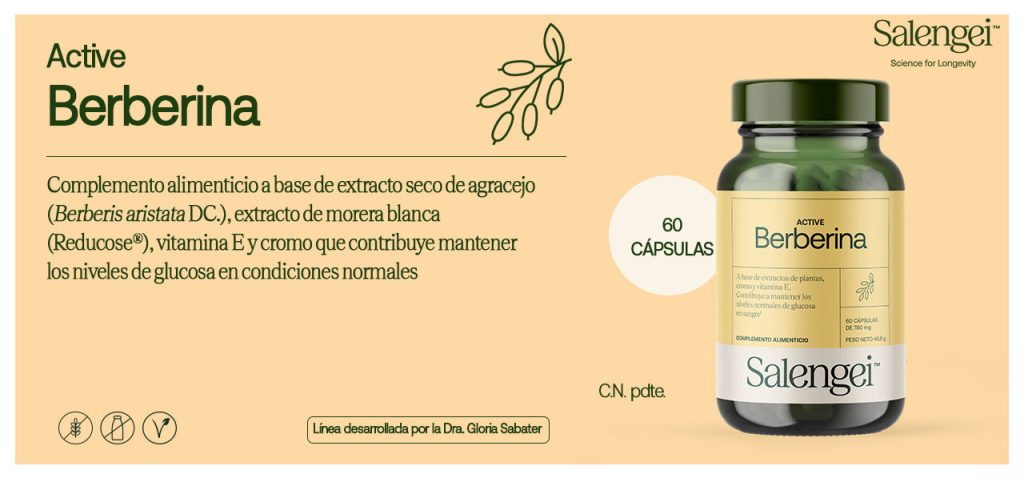Berberine, benefits, uses and precautions to take into account

In recent years, berberine has gained recognition in the natural supplement arena due to its positive effects on metabolic, cardiovascular, and digestive health. This plant alkaloid, used for centuries in traditional Chinese and Ayurvedic medicine, has been the subject of multiple scientific studies that have confirmed its impact on glucose regulation, cholesterol reduction and its role as a powerful anti-inflammatory and antioxidant agent.
Extracted from the Berberis aristata plant, berberine acts at the cellular level by modulating various metabolic pathways, making it a supplement of growing interest for those looking for natural alternatives for blood sugar control and overall health.
In this article, we will explore what berberine is for, its main benefits, the precautions to consider before consumption, and the keys to choosing a quality supplement.
What is berberine and what is it for?
Berberine is a bioactive alkaloid present in various plant species and has been traditionally used in Eastern medicine for its antimicrobial, anti-inflammatory and metabolism-regulating properties.
Chemically it is an isoquinoline alkaloid with a tetracyclic structure, belonging to the group of protoberberines. It is characterized by a system of conjugate rings that gives it high stability and capacity to interact with biomolecules, which explains its various biological properties.
In terms of mode of action, berberine exerts its effect primarily through the activation of AMP-activated protein kinase (AMPK), considered a “master energy sensor” in cells. AMPK regulates key metabolic processes, such as:
- Increased glucose uptake in muscle cells for use as an energy source.
- Decreased hepatic gluconeogenesis, which reduces the excessive production of de novo glucose in the liver, and this in turn contributes to the regulation of blood glucose.
- Improves mitochondrial function and fatty acid oxidation, favoring the reduction of body fat and optimizing energy metabolism.
- Inhibition of cholesterol and triglyceride synthesis, which positively impacts cardiovascular health.
In addition, berberine modulates the expression of genes related to inflammation and oxidative stress, providing anti-inflammatory and antioxidant effects. It has also been observed that it interacts with the intestinal microbiota, favoring the balance of beneficial bacteria, which explains its use in the treatment of digestive disorders.
Thanks to this combination of mechanisms, berberine has proven to be a compound of great interest in the management of type 2 diabetes, dyslipidemia and metabolic syndrome, becoming a natural alternative with scientific support to improve metabolic and cardiovascular health.

Main uses of berberine:
- Blood glucose control: Improves insulin sensitivity and reduces glucose resistance, making it especially useful for people with type 2 diabetes.
- Cardiovascular health: reduces LDL cholesterol, improves endothelial function, and decreases arterial inflammation.
- Digestive health: it has been used in traditional medicine to combat gastrointestinal infections (e.g. Helicobacter pylori) and modulate the microbiota, promoting a healthy balance in the intestine.
- Weight loss and metabolism: promotes weight reduction by improving lipid metabolism and energy conversion.
- Antioxidant properties: works by regulating the activity of endogenous antioxidant enzymes, such as superoxide dismutase (SOD), catalase (CAT) and glutathione peroxidase (GPx). These enzymes play a crucial role in scavenging free radicals.
Due to its wide spectrum of benefits, berberine has positioned itself as a high-value supplement for those looking to improve their metabolic and cardiovascular health naturally.
Benefits of Berberine
1. Glucose control and insulin regulation
One of the most studied benefits of berberine is its ability to lower blood glucose levels. It acts similarly to metformin, a drug widely used to treat type 2 diabetes, by improving insulin sensitivity and reducing liver glucose production.
Several studies have shown that berberine supplementation can reduce fasting glucose levels by up to 20-30%, making it a natural option with great potential for diabetes management. DOI: 10.1016/j.heliyon.2023.e21233
2. Cardiovascular benefits and cholesterol reduction
Berberine has shown positive effects in reducing total cholesterol, triglycerides, and LDL cholesterol, while improving HDL (good cholesterol) levels. In addition, its ability to improve endothelial function and reduce arterial inflammation makes it an excellent ally for heart health. https://doi.org/10.3389/fphar.2021.764175
3. Support in weight loss and metabolism
Studies have indicated that berberine aids weight loss by improving fat metabolism and cellular energy regulation. Its activation of AMPK, also known as the “master metabolic switch,” contributes to fat burning and reduced insulin resistance. https://doi.org/10.3390/biomedicines10071739
4. Antioxidant and antimicrobial properties
Berberine fights oxidative stress by reducing the production of free radicals and strengthening mitochondrial function. In addition, its antimicrobial action makes it a natural alternative to treat digestive and respiratory infections, acting against bacteria such as Helicobacter pylori and Escherichia coli. DOI:10.1016/j.heliyon.2023.e21233
Where to buy berberine?
For those looking to buy berberine, it is essential to choose high-quality supplements that guarantee their purity, bioavailability, and effective concentration. Due to its growing popularity, there are multiple options on the market, but not all of them meet the appropriate standards to ensure their benefits. When selecting a berberine supplement, it is advisable to keep in mind that it is from a natural source and standardized extract. In addition, they should be formulas free of unnecessary additives, such as artificial fillers or preservatives that can compromise the purity of the product. And something very important is thequality certifications, both in preparation and in the origin of its ingredients.
In this sense, Salengei is a benchmark brand in the supplementation sector, offering high-quality berberine with maximum bioavailability. The effectiveness of Active Berberine lies in its combination of high-quality ingredients and optimal concentration, designed to maximize the metabolic, antioxidant, and cardiovascular benefits of berberine. Its formulation includes:
- Dry extract of Indian barberry bark (Berberis aristata DC.) 97% berberine hydrochloride. This extract ensures high purity and bioavailability, which boosts the activation of AMP-activated protein kinase (AMPK), a key regulator of energy metabolism. Its action contributes to the reduction of blood glucose, the improvement of insulin sensitivity and the regulation of cholesterol and triglycerides.
- Dry extract of white mulberry leaf (Morus alba L.) This innovative extract, patented as Reducose®, acts as a natural modulator of carbohydrate absorption. Its mechanism of action inhibits the activity of enzymes that break down sugars in the gut, which slows down glucose absorption and contributes to better control of blood sugar levels after meals.
The synergy between berberine and white mulberry extract amplifies the supplement’s effects on glucose and lipid metabolism, making it an ideal choice for those seeking natural support in managing insulin resistance, weight management, and optimizing cardiovascular health. Visit our Salengei online store and find out how to incorporate it into your daily routine.

Contraindications of berberine
Although berberine offers multiple benefits, it is not without contraindications and should be used with caution in certain cases:
- Drug interactions: can potentiate the effect of medications such as anticoagulants and antihypertensives, so it is recommended to consult with a health professional before use.
- Not recommended in pregnancy and lactation: berberine can cross the placental barrier and affect fetal development, so its consumption is not recommended during pregnancy or breastfeeding.
- Possible side effects: In some people, it can cause mild digestive discomfort, such as diarrhea, nausea, or stomach cramps, especially in high doses.
- People with liver or kidney disease: Caution is advised in individuals with liver or kidney impairment, as berberine may affect the metabolism of certain drugs.
How to incorporate berberine into your routine
To reap the benefits of berberine without exceeding the recommended dose, it is recommended:
- Standard dose: between 900 and 1,500 mg daily, divided into 2-3 doses with meals to improve absorption.
- Combination with a balanced diet: enhance its effects with a diet rich in fiber, proteins and healthy fats.
- Avoid combinations with medications without medical supervision.
Berberine can complement natural health strategies, but its effectiveness is greatest when combined with healthy habits.
Conclusion
Berberine is a natural supplement with scientifically backed properties for blood sugar regulation, cardiovascular health, digestive function, and metabolism. Its ability to activate AMPK and improve insulin sensitivity makes it a valuable ally in the prevention and management of various metabolic conditions.
If you are looking to buy berberine, make sure to choose quality products, such as those from Salengei, which guarantee purity and efficacy. Remember that supplementation must be accompanied by a healthy lifestyle and you should always consult with a health professional before starting its consumption.










